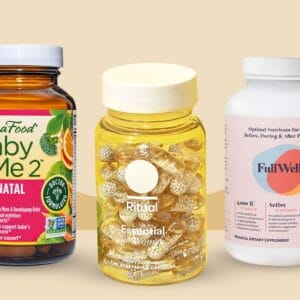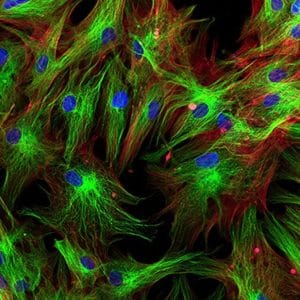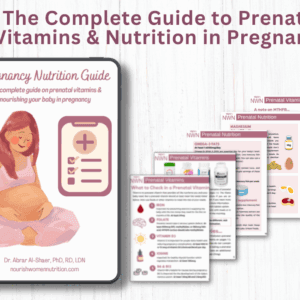During pregnancy, a woman’s body undergoes significant changes to support the growth and development of her baby. A well-balanced diet is crucial, but it can be challenging to get all the necessary nutrients. Prenatal vitamins help fill nutritional gaps, ensuring the health and well-being of both mother and baby. With numerous options available, selecting the right prenatal vitamin can be overwhelming. This article highlights the top prenatal vitamins for pregnancy care, providing expectant mothers with the information they need to make informed decisions about their health and their baby’s health during this critical period.

Essential Nutrients in Prenatal Vitamins for a Healthy Pregnancy
When it comes to pregnancy care, selecting the right prenatal vitamins is crucial. Prenatal vitamins are dietary supplements that contain essential nutrients needed for a healthy pregnancy. These vitamins support the mother’s health and the baby’s development throughout the pregnancy.
Nutrient-Rich Prenatal Vitamins for Fetal Development
Prenatal vitamins play a significant role in supporting fetal development. They contain folic acid, which is crucial for preventing birth defects of the brain and spine. Other essential nutrients include iron, which supports the mother’s and baby’s health by preventing anemia, and calcium, which is vital for the development of the baby’s bones, teeth, and muscles.
| Nutrient | Importance | Recommended Daily Intake |
|---|---|---|
| Folic Acid | Prevents birth defects of the brain and spine | 600-800 mcg |
| Iron | Supports the mother’s and baby’s health by preventing anemia | 27 mg |
| Calcium | Vital for the development of the baby’s bones, teeth, and muscles | 1,000 mg |
Benefits of Prenatal Vitamins for Mother’s Health
Prenatal vitamins not only support fetal development but also contribute to the mother’s overall health. They help in maintaining the mother’s energy levels, supporting her immune system, and ensuring that she gets all the necessary nutrients for her well-being.
Key Ingredients to Look for in Prenatal Vitamins
When choosing prenatal vitamins, it’s essential to look for certain key ingredients. These include omega-3 fatty acids, which support fetal brain development, vitamin D, which is crucial for bone health, and probiotics, which support digestive health.
| Ingredient | Benefit |
|---|---|
| Omega-3 Fatty Acids | Supports fetal brain development |
| Vitamin D | Crucial for bone health |
| Probiotics | Supports digestive health |
How to Choose the Best Prenatal Vitamins
Choosing the best prenatal vitamins involves considering several factors, including the presence of essential nutrients, the manufacturer’s reputation, and any specific dietary needs or restrictions. It’s also advisable to consult with a healthcare provider to get personalized recommendations.
Potential Risks and Side Effects of Prenatal Vitamins
While prenatal vitamins are generally safe, there can be potential risks and side effects, such as nausea, constipation, or allergic reactions to certain ingredients. It’s crucial to follow the recommended dosage and consult with a healthcare provider if any adverse effects are experienced.
| Potential Side Effect | Precaution |
|---|---|
| Nausea | Take with food or adjust the timing |
| Constipation | Increase fluid intake and dietary fiber |
| Allergic Reactions | Consult with a healthcare provider and consider alternative options |
What is the best prenatal vitamin to get pregnant?

The best prenatal vitamin to get pregnant is a crucial consideration for women planning to conceive. A well-chosen prenatal vitamin can help ensure that the body is adequately prepared for pregnancy, supporting a healthy conception and fetal development. When selecting a prenatal vitamin, it’s essential to look for a product that contains essential nutrients such as folic acid, iron, calcium, and omega-3 fatty acids.
Key Nutrients in Prenatal Vitamins
A prenatal vitamin that is rich in key nutrients is vital for supporting a healthy pregnancy. Folic acid, for example, is crucial for preventing birth defects of the brain and spine. Iron is also essential, as it supports the production of red blood cells and helps prevent anemia. Other important nutrients include calcium, which supports fetal bone development, and omega-3 fatty acids, which promote fetal brain and eye development. Some of the key nutrients to look for in a prenatal vitamin include:
- Folic acid: 400-800 mcg per day to prevent birth defects
- Iron: 27 mg per day to support red blood cell production
- Calcium: 200-300 mg per day to support fetal bone development
Types of Prenatal Vitamins
There are various types of prenatal vitamins available, including multivitamins, prenatal-specific vitamins, and gummies. Multivitamins are general supplements that contain a broad range of vitamins and minerals, while prenatal-specific vitamins are formulated specifically to meet the nutritional needs of pregnant women. Gummies are a popular option for women who have trouble swallowing pills. When choosing a prenatal vitamin, consider the following:
- Multivitamins: May not contain sufficient amounts of key nutrients like folic acid and iron
- Prenatal-specific vitamins: Formulated to meet the specific nutritional needs of pregnant women
- Gummies: May be a good option for women who have trouble swallowing pills, but may contain added sugars
Pre-Conception Considerations
When trying to conceive, it’s essential to consider the pre-conception nutritional needs of the body. A well-nourished body is better equipped to support a healthy pregnancy. In addition to taking a prenatal vitamin, women should also focus on consuming a balanced diet rich in whole foods, fruits, and vegetables. Some key pre-conception considerations include:
- Eating a balanced diet: Focus on whole foods, fruits, and vegetables
- Maintaining a healthy weight: Being underweight or overweight can affect fertility
- Avoiding excessive caffeine and alcohol: Both can negatively impact fertility and fetal development
What pregnancy vitamins do doctors recommend?

Doctors recommend that pregnant women take prenatal vitamins to ensure they are getting enough essential nutrients. These vitamins typically contain a combination of folic acid, iron, and calcium, among other nutrients. Folic acid is crucial in preventing birth defects of the brain and spine, while iron helps to support the mother’s and baby’s health by preventing anemia. Calcium is also vital for the development of the baby’s bones, teeth, and muscles.
Key Nutrients in Prenatal Vitamins
Prenatal vitamins contain a range of essential nutrients that support the health and development of both mother and baby. These nutrients are crucial during pregnancy, as they help to prevent complications and support fetal development. Some of the key nutrients found in prenatal vitamins include:
- Folic acid: prevents birth defects of the brain and spine
- Iron: supports the mother’s and baby’s health by preventing anemia
- Calcium: vital for the development of the baby’s bones, teeth, and muscles
Choosing the Right Prenatal Vitamin
When choosing a prenatal vitamin, it’s essential to consider the types and amounts of nutrients it contains. Doctors recommend selecting a vitamin that contains 600-800 mcg of folic acid and 27 mg of iron. Additionally, the vitamin should be free from unnecessary ingredients and be gentle on the stomach. Some other factors to consider when choosing a prenatal vitamin include:
- The presence of omega-3 fatty acids, which support fetal brain development
- The absence of artificial colors and flavors, which can be irritating to some women
- A gentle formula that minimizes the risk of nausea and stomach upset
Benefits of Taking Prenatal Vitamins
Taking prenatal vitamins during pregnancy can have numerous benefits for both mother and baby. These benefits include a reduced risk of birth defects, improved fetal development, and a healthier pregnancy overall. Some of the specific benefits of taking prenatal vitamins include:
- A reduced risk of neural tube defects, such as spina bifida
- Improved fetal development, including the development of the brain, spine, and other vital organs
- A lower risk of pregnancy complications, such as preeclampsia and anemia
What type of vitamins do doctors recommend during pregnancy?

During pregnancy, doctors typically recommend a range of vitamins and nutrients to support the health and development of both the mother and the fetus. The specific vitamins and nutrients recommended can vary depending on factors such as the stage of pregnancy, the mother’s overall health, and any specific nutritional deficiencies or concerns.
Essential Vitamins for Pregnancy
The most critical vitamins for pregnant women include folic acid, iron, and calcium. Folic acid is particularly important during the early stages of pregnancy, as it helps to prevent birth defects of the brain and spine. Iron is also crucial, as it supports the production of red blood cells and helps to prevent anemia. Calcium is essential for the development of the fetus’s bones, teeth, and muscles.
- Folic acid: prevents birth defects of the brain and spine
- Iron: supports the production of red blood cells and prevents anemia
- Calcium: essential for fetal bone, teeth, and muscle development
Other Recommended Nutrients
In addition to the essential vitamins mentioned, doctors may also recommend other nutrients to support a healthy pregnancy. These can include omega-3 fatty acids, vitamin D, and probiotics. Omega-3 fatty acids support fetal brain and eye development, while vitamin D is important for bone health and immune function. Probiotics can help to support the mother’s digestive health and prevent complications such as gestational diabetes.
- Omega-3 fatty acids: support fetal brain and eye development
- Vitamin D: important for bone health and immune function
- Probiotics: support maternal digestive health and prevent gestational diabetes
Food Sources and Supplements
While a balanced diet that includes a variety of whole foods can provide many of the essential vitamins and nutrients needed during pregnancy, supplements may also be recommended. Pregnant women can obtain the necessary nutrients through food sources such as leafy greens, citrus fruits, and fortified cereals, or through prenatal supplements.
- Leafy greens: rich in folic acid and iron
- Citrus fruits: high in vitamin C, which supports immune function
- Fortified cereals: often enriched with folic acid, iron, and other essential nutrients
What's the best prenatal care?

The best prenatal care is a comprehensive and multidisciplinary approach that involves regular check-ups with a healthcare provider, a healthy lifestyle, and education on pregnancy, childbirth, and parenting. Regular prenatal care is essential to monitor the health of both the mother and the fetus, identify potential complications, and provide timely interventions. A well-structured prenatal care plan can help reduce the risk of pregnancy-related complications and promote a healthy pregnancy outcome.
Prenatal Care Components
Prenatal care encompasses a range of services and activities that are designed to support the physical and emotional well-being of pregnant women. These services typically include regular check-ups with a healthcare provider, ultrasound examinations, and screening tests for gestational diabetes and hypertension.
- Initial Assessment: A comprehensive medical history and physical examination to identify any pre-existing medical conditions or risk factors.
- Ongoing Monitoring: Regular check-ups to monitor fetal growth, detect potential complications, and provide guidance on pregnancy-related issues.
- Patient Education: Education on pregnancy, childbirth, and parenting to empower women to make informed decisions about their care.
Nutritional Support
A well-balanced diet is essential during pregnancy to support the health and development of both the mother and the fetus. Folic acid supplementation is recommended to prevent birth defects, while iron supplements may be prescribed to prevent anemia.
- Folate-Rich Foods: Consuming foods rich in folate, such as leafy greens and legumes, to support fetal development.
- Protein Intake: Adequate protein intake to support fetal growth and development.
- Calcium Supplements: Calcium supplements may be recommended to support fetal bone development.
Lifestyle Modifications
A healthy lifestyle is crucial during pregnancy to minimize the risk of complications and promote a healthy pregnancy outcome. Smoking cessation and alcohol avoidance are strongly recommended, while moderate exercise can help maintain physical and mental well-being.
- Exercise Routine: Engaging in moderate-intensity exercise, such as brisk walking or swimming, to promote physical health.
- Stress Management: Practicing stress-reducing techniques, such as meditation or deep breathing, to manage stress and anxiety.
- Sleep Hygiene: Establishing a consistent sleep schedule and creating a sleep-conducive environment to promote restful sleep.
Frequently Asked Questions
What are the essential nutrients in top prenatal vitamins for pregnancy care?
Top prenatal vitamins for pregnancy care are typically rich in folic acid, iron, calcium, and omega-3 fatty acids. These nutrients play a crucial role in supporting the health and development of both the mother and the baby. Folic acid helps prevent birth defects of the brain and spine, while iron supports the production of red blood cells. Calcium is essential for the development of the baby’s bones, teeth, and muscles, and omega-3 fatty acids support the baby’s brain and eye development.
How do prenatal vitamins support fetal development during pregnancy?
Prenatal vitamins support fetal development by providing essential nutrients that may be lacking in the mother’s diet. These vitamins help to ensure that the baby receives the necessary building blocks for growth and development. For example, vitamin D and calcium support bone development, while iron and folic acid support the production of red blood cells and prevent birth defects. By taking a prenatal vitamin, expectant mothers can help to reduce the risk of complications and support a healthy pregnancy.
Can prenatal vitamins help alleviate pregnancy symptoms?
While prenatal vitamins are primarily taken to support fetal development, they can also help to alleviate some pregnancy symptoms. For example, iron can help to reduce the severity of anemia, which can cause fatigue and weakness. Additionally, calcium and magnesium can help to alleviate leg cramps and other muscle spasms. By supporting overall health and wellness, prenatal vitamins can help expectant mothers to feel more comfortable and energized throughout their pregnancy.
Are there any specific prenatal vitamins recommended for women with dietary restrictions?
Women with dietary restrictions, such as vegetarians or vegans, may need to choose prenatal vitamins that are specifically formulated to meet their needs. For example, vegan prenatal vitamins may contain alternative sources of iron and calcium, such as plant-based ingredients. Additionally, women with gluten intolerance or dairy allergies should choose prenatal vitamins that are gluten-free or dairy-free. By choosing a prenatal vitamin that is tailored to their individual needs, women with dietary restrictions can ensure that they are getting the nutrients they need to support a healthy pregnancy.














